Introduction
- The internet has provided people with a cheap and easy way of communicating.
- However, internet has been associated with complex crimes which have posed a big challenge to law enforcement officials all over the world.
- These crimes range from identity theft, internet scams, cyber stalking, online gambling, pirating, illegal trade, cyber terrorism and fraudulent transactions among others.
- Cyber criminals invade privacy, destroy brands, harm others and even destroy public trust.
The internet has provided people with a cheap and easy way of communicating. People can access a lot of information, entertainment and is a good avenue for socioeconomic and political activities. However, the internet has been associated with the complex crimes, which have posed a big challenge to law enforcement officials all over the world. These crimes range from identity theft, internet scams, cyber stalking, online gambling, pirating, illegal trade, cyber terrorism and fraudulent transactions among others. While some people engage in these activities as harmless fun and adventure, others are criminals who are determined to use the internet for their own selfish gains. In this case, they invade privacy, destroy brands, harm others and even destroy public trust. From the year 2000, the number of the reported cases has been increasing. However, there are still other cases that have gone unreported since victims have fear that they may be exposed to vulnerabilities.
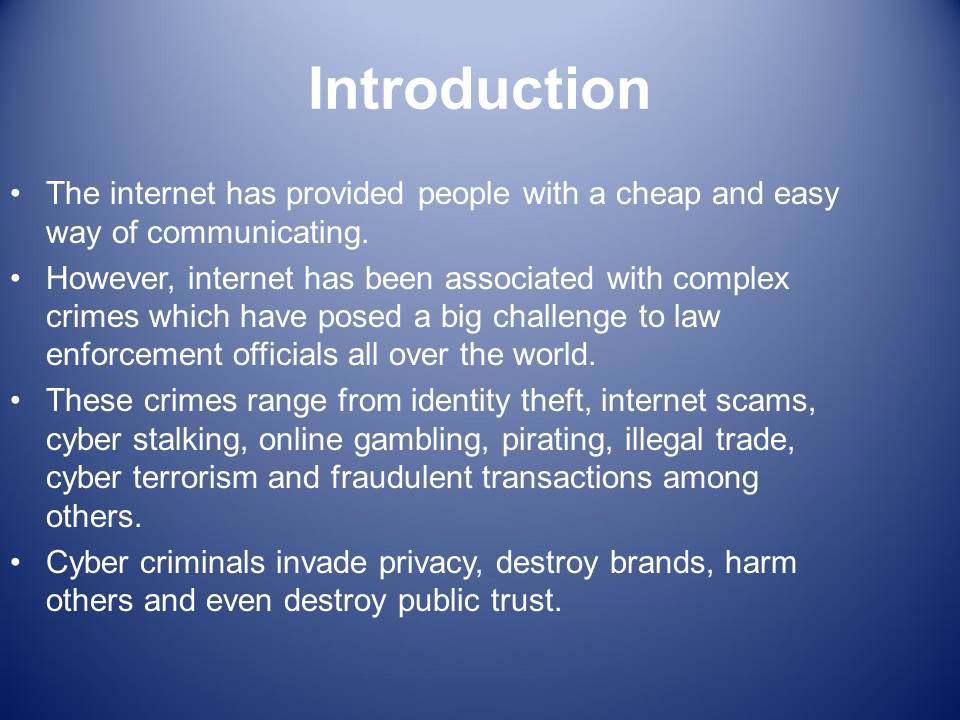
Internet Crimes
Internet Crime Evolution
- When computers were new, very few people were conversant with them, and their use was limited to a few organizations which could afford them
- Cyber crime began with unsatisfied employees who caused physical damage to computers
- Initially, criminals focused their efforts on home users through spreading viruses, identity theft, and cyber stalking
- The internet has come with many opportunities for internet crimes (Reyes, 2007).
When computers were new, very few people were conversant with them, and their use was limited to a few organizations which could afford them. Initially, the internet presence was experienced by few people hence few cases of computer crimes. Cyber crime began with unsatisfied employees who caused physical damage to computers to get back at their employers in the early 1980s. It has since grown with the increasing popularity of personal computers in homes and the availability of the internet. Initially, criminals focused their efforts on home users through spreading viruses, identity theft, and cyber stalking. With the increasing technology, organizations are also at risk since criminals are determined to hack information and use it to perform transactions that may result in loss of funds or important information. The introduction of the World Wide Web in the 1990s and the evolution of social networking sites in the 21st century have come with many opportunities for internet crimes. Computer crimes keep advancing due to the fast developments in technology (Reyes, 2007).
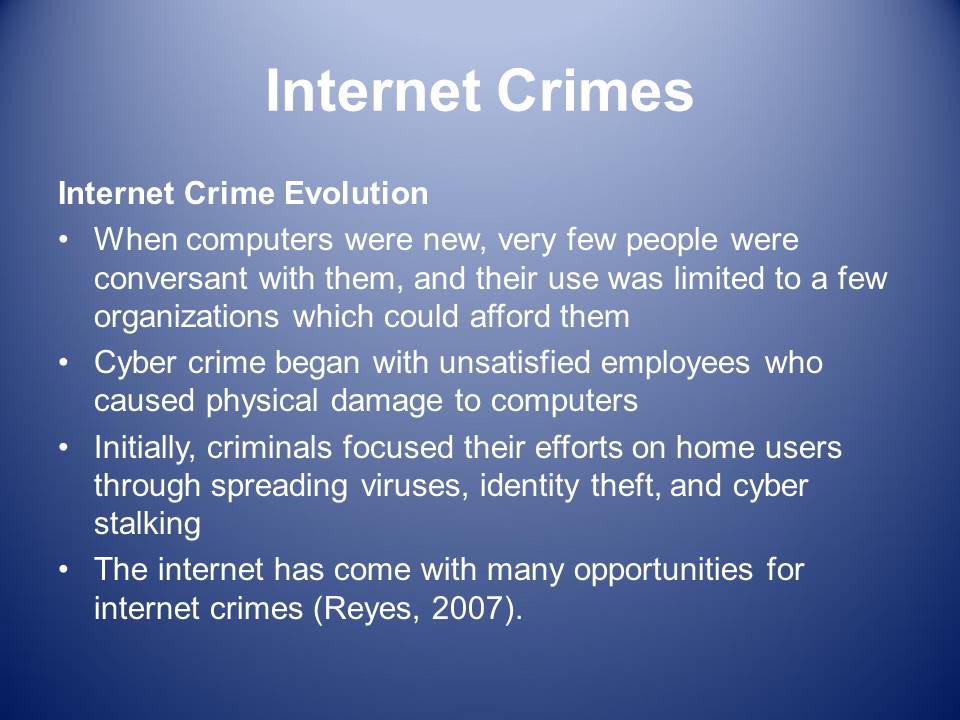
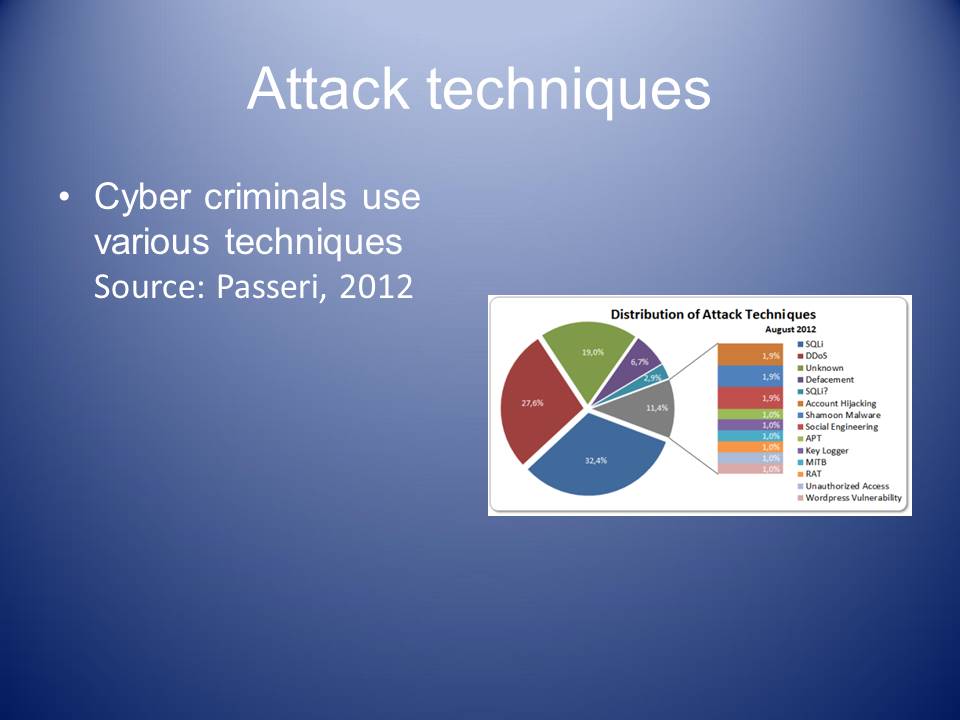
Common Internet Crimes
Hacking and Viruses
- Hacking is the most popular form of internet crime.
- Hackers may overwhelm target sites with a lot of information to slow down the system and crash it
- Viruses may be used by criminals to erase important data
- Mostly, internet criminals have threatened e-commerce since their main purpose is to obtain funds illegally.
- Hackers target banks and other financial institutions(Darlington, 2006).
Hacking is the most popular form of internet crime. In hacking, an individual enters private networks and change information or even prevents the legal user from accessing information. In other cases, hackers may overwhelm target sites with a lot of information to slow down the system and crash it. Viruses used by criminals to erase important data or lock up systems are similar to hacking. They take advantage of the lost data to make false claims. They may also generate new data, which may serve to exhort funds or other resources from their victims. Mostly, internet criminals have threatened e-commerce since their main purpose is to obtain funds illegally. They do so by obtaining security information from organization’s customers and using this information to conduct fraudulent activities. It mostly affects banks and other financial institutions. At times, criminals create illegal sites and use them to sell their own products using well known brands (Darlington, 2006).
Pirating and Illegal Trading
- Digital technology has facilitated internet criminals to infringe on copyright laws
- It is closely linked to illegal trading
- Fraud is also popular
- Criminals have advanced to packet reading
- Other forms of fraud exist to swindle innocent victims (Darlington, 2006).
- Online shopping is also greatly affected (Brenner, 2010).
Digital technology has also made it easy for internet criminals to copy creative products such as films and music. Through the internet, many people can share pirated material at lower fees that do not get to the original composer. It is closely linked to illegal trading in which people use newsgroups, bulletin boards or even newsgroups to commit crimes such as parallel trading or counterfeit of established brands. Fraud is also popular, and criminals have advanced to packet reading. In this case, hackers locate data patterns in credit and debit cards and copy this data to reproduce similar ones. Other forms of fraud exist in which fraudsters introduce extra fees for the services they have signed up for without the knowledge of the service users (Darlington, 2006). Online shopping is also affected in occasions where legal registered sellers offer consumers the wrong products (Brenner, 2010).
Internet Scams and Cyber Stalking
- Scams are very popular with internet criminals
- They often require information such as credit card details, bank account details, passwords and social security numbers (Brenner, 2010)
- Notably, social sites have also facilitated internet crimes
- This has led to increased Cyber Stalking
- This has been exploited by rapists and pedophiles
- Criminals use malicious communications through the internet to cause distress and anxiety (Darlington, 2006).
Scams are very popular with criminals enticing their victims to give confidential information with a promise to get them rich. They often require information such as credit card details, bank account details, passwords and social security numbers. It mostly affects those who have limited knowledge on the internet and its dangers (Brenner, 2010). Similarly, the advent of social sites such as MySpace and Facebook has made it easy for criminals to stalk their victims by learning about their hobbies, professions and daily activities. This is common among rapists and pedophiles who take advantage of the social sites to catch the attention of their victims. The UK has experienced multiple cases in which criminals use malicious communications through the internet to cause distress and anxiety (Darlington, 2006).
Cyber Terrorism
- Cyber terrorism has become a major threat
- Cyber terrorists design and send computer based attacks
- This is meant to destroy target networks, systems, or even stored information
- These criminals are known to purchase aging computers
- They use them to crack passwords and gain access to critical data
- Militaries and governments are the most affected groups (Brenner, 2010).
Cyber terrorism has become a major threat since the internet has made it easy for criminals to advance their social and political objectives. Cyber terrorists design and send computer based attacks to destroy target networks, systems, or even stored information to make those operating the given system helpless. Once they destroy networks, they can invade or access information without being monitored. Through the internet, terrorists can also coerce or intimidate the target organizations and governments by sending anonymous threat messages. These criminals are known to purchase aging computers. They use them to crack passwords or guide them into accessing delicate information for them to install similar programs to ease access. This affects militaries and governments and poses security attacks (Brenner, 2010).
Online Gambling
- The online gambling industry has provided a variety of services
- However, this has raised issues on consumer confidence, integrity, security and fairness in the games
- The criminals cheat on others during gambling activities
- This form of crime is common in the UK, Canada, and Australia (McMullan & Rege, 2010).
The online gambling industry has provided a variety of services including casino games, poker, blackjack, bingo, and lottery games among others. However, this has raised issues on consumer confidence, integrity, security and fairness in the games. Criminals have taken advantage of technology to cheat on others during gambling activities. For instance, they use computer viruses to see the hands of their opponents during play. A study indicated that 50% of casino players believed that internet providers cheated on them and were dissatisfied with the way their complaints are processed. This form of crime is common in the UK, Canada, and Australia (McMullan & Rege, 2010).
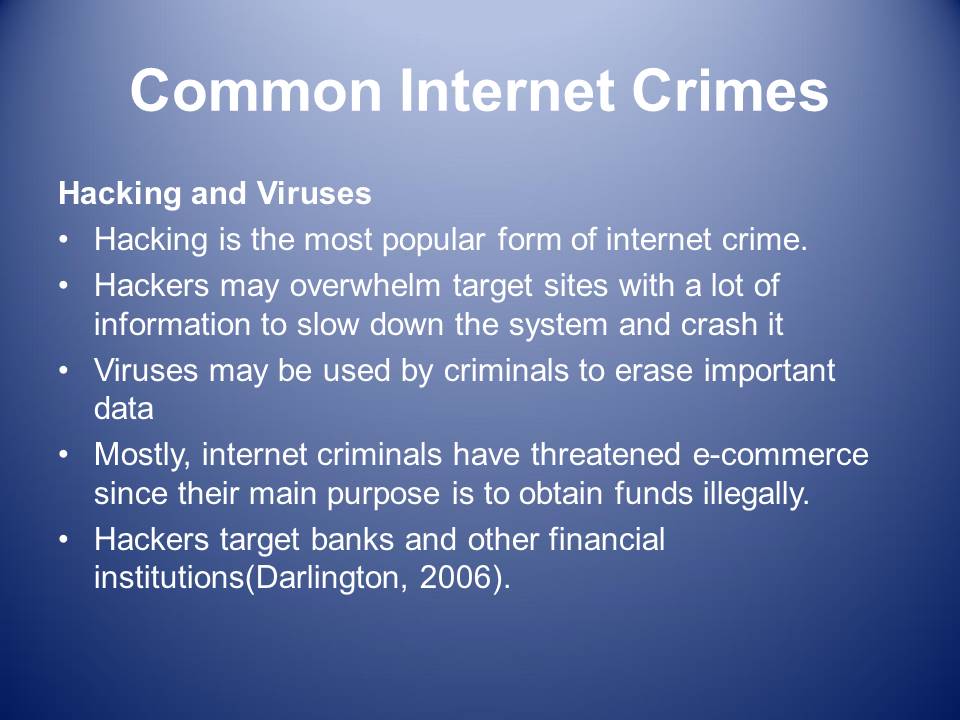
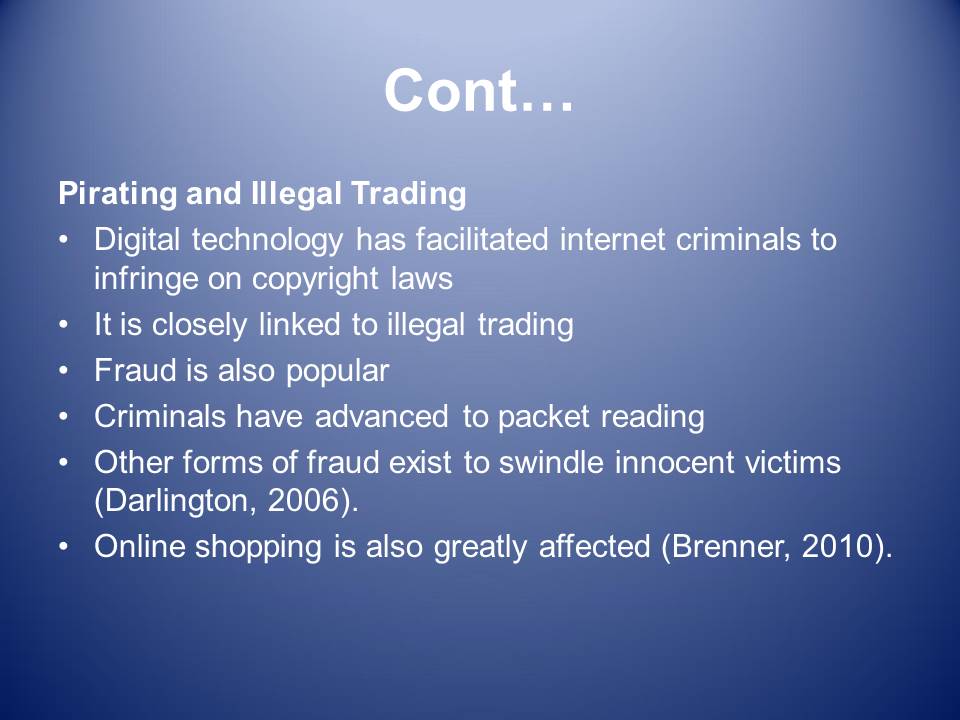
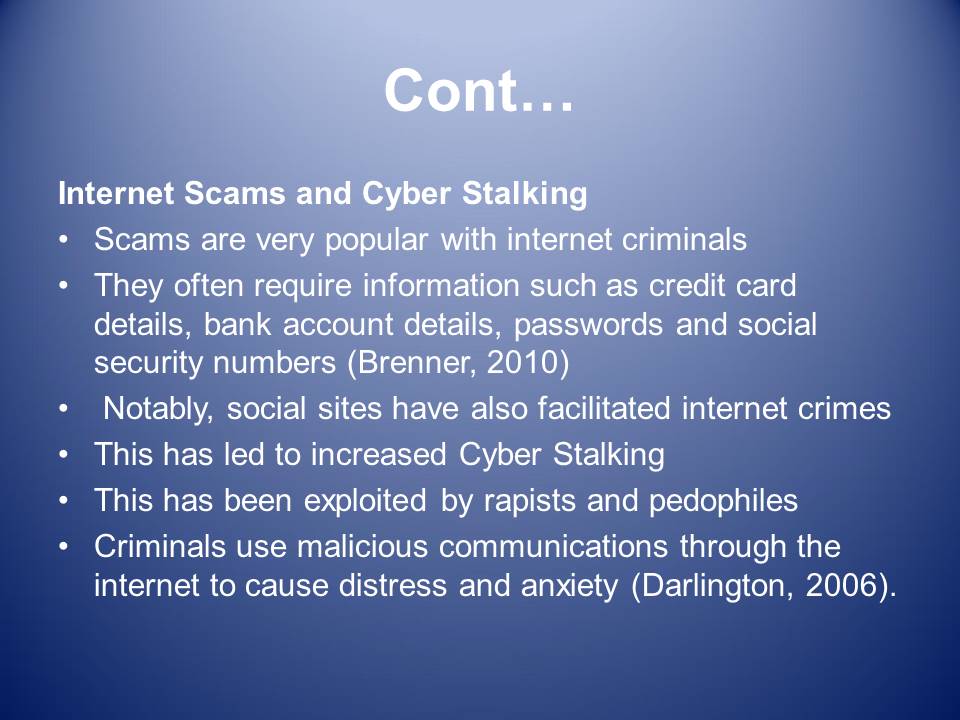
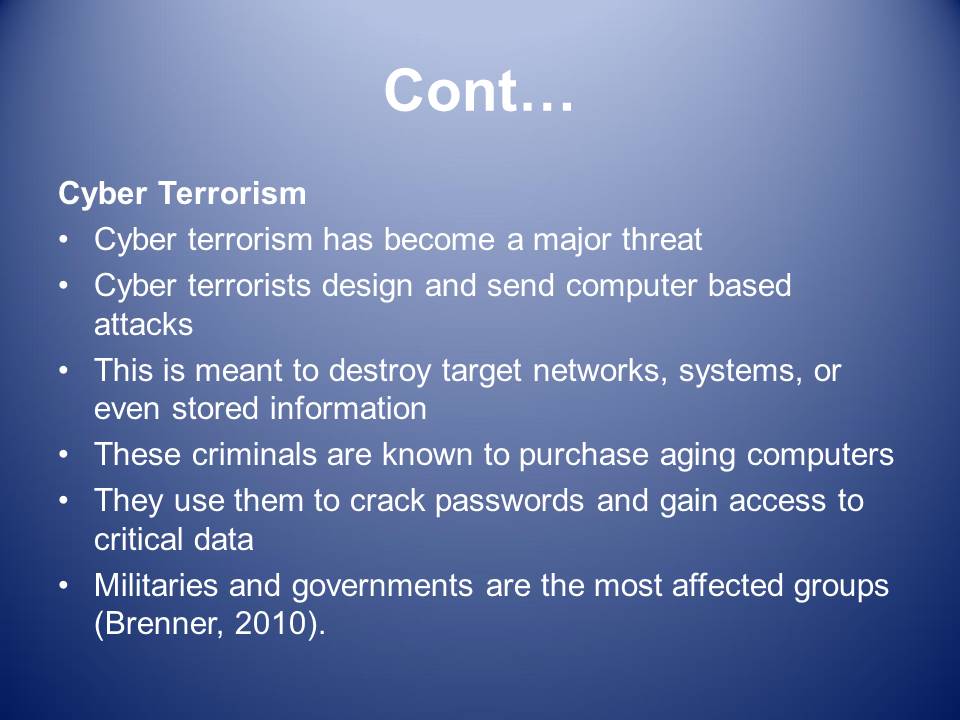
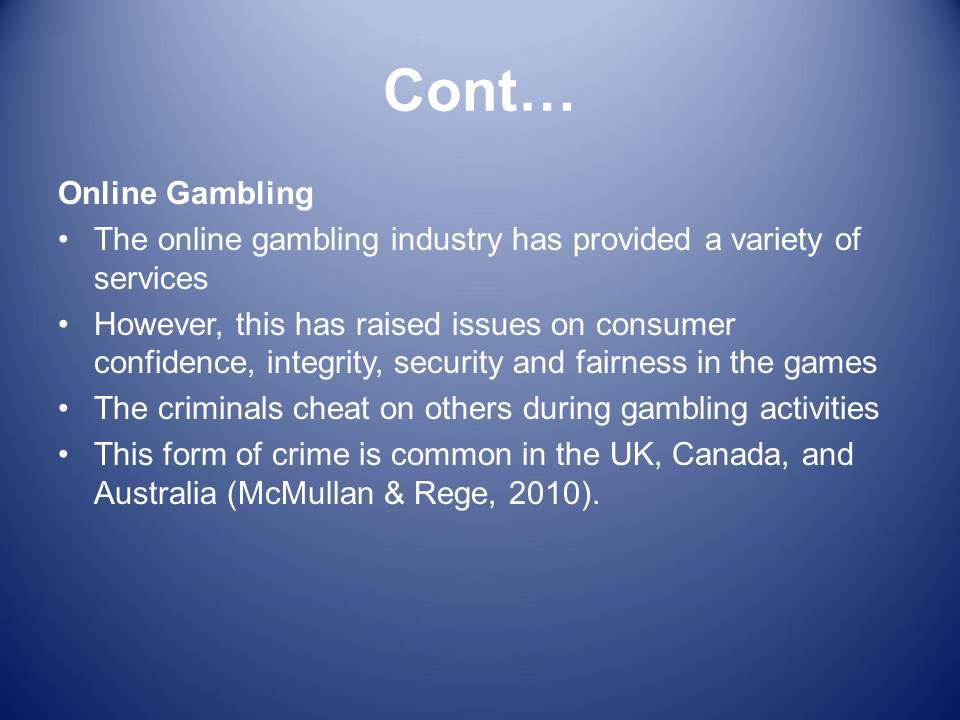
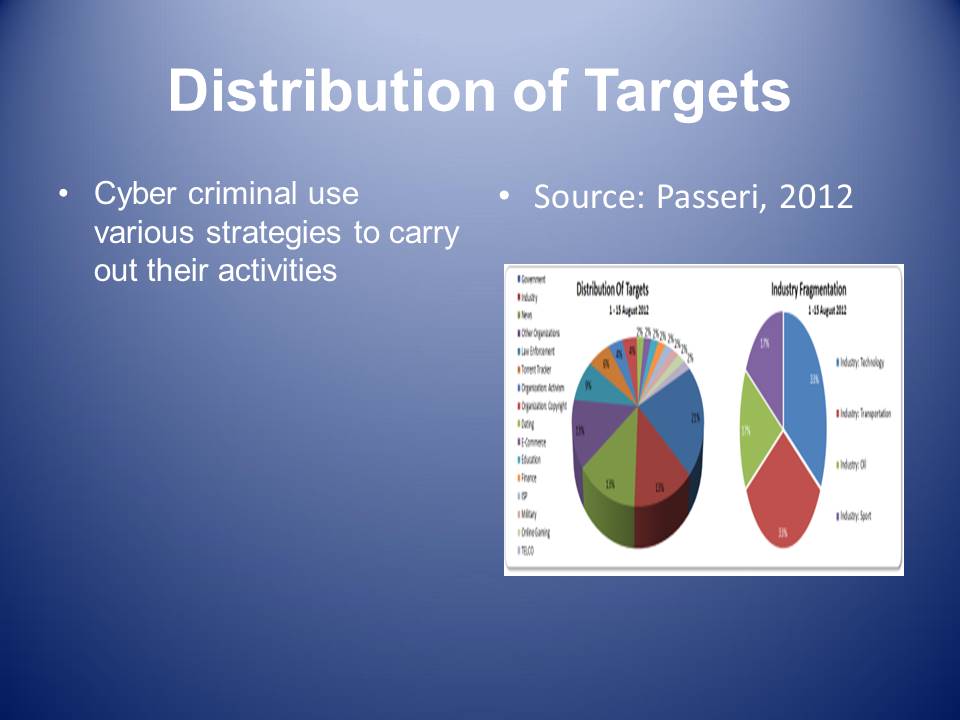
Conclusion
- The internet crimes pose a threat to individuals, organizations and states.
- They involve people from different geographic areas.
- Thus, it is hard to catch and punish the criminals.
- A personal initiative is the best strategy to curb this crime.
- The criminals have become a nuisance and they keep changing their strategies.
- They have perfected their game for their own selfish gains, harm others and destroy public trust.
In as much as the internet has provided a platform for social-economic development and cultural integration, internet crimes pose a threat to individuals, organizations and states. They involve people from different geographic areas. Thus, it is hard to catch and punish the criminals. The problem can only be minimized through personal initiatives in which individuals take precaution in the way they share internet resources with others. There is a big probability that this problem will keep on growing due to the efforts put by internet criminals in keeping up with the technology. They use it for their own selfish gains, harm others and destroy public trust.
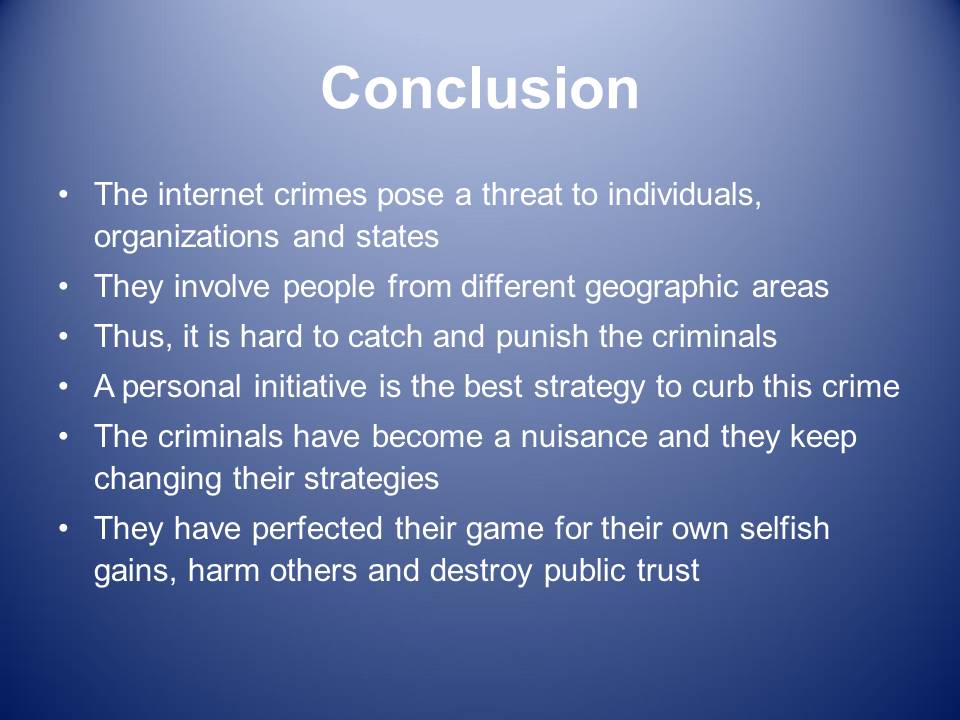
References
Brenner, S. W. (2010). Cybercrime: Criminal threats from cyberspace. Santa Barbara, Calif: Praeger.
Darlington, R. (2006). Crime on The Net. Web.
McMullan, J.L. & Rege, A. (2010). Online Crime and Internet Gambling. Journal of Gambling Issues, 24(5), 54-85.
Passeri, P. (2012). 1-15 September 2012 Cyber Attacks Timeline. Web.
Reyes, A. (2007). Cyber crime investigations: Bridging the gaps between security professionals, law enforcement, and prosecutors. Rockland, MA: Syngress Pub.